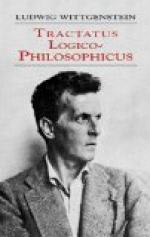4.0641 One could say that negation must be related to the logical place determined by the negated proposition. The negating proposition determines a logical place different from that of the negated proposition. The negating proposition determines a logical place with the help of the logical place of the negated proposition. For it describes it as lying outside the latter’s logical place. The negated proposition can be negated again, and this in itself shows that what is negated is already a proposition, and not merely something that is prelimary to a proposition.
4.1 Propositions represent the existence and non-existence of states of affairs.
4.11 The totality of true propositions is the whole of natural science (or the whole corpus of the natural sciences).
4.111 Philosophy is not one of the natural sciences. (The word ‘philosophy’ must mean something whose place is above or below the natural sciences, not beside them.)
4.112 Philosophy aims at the logical clarification of thoughts. Philosophy is not a body of doctrine but an activity. A philosophical work consists essentially of elucidations. Philosophy does not result in ’philosophical propositions’, but rather in the clarification of propositions. Without philosophy thoughts are, as it were, cloudy and indistinct: its task is to make them clear and to give them sharp boundaries.
4.1121 Psychology is no more closely related to philosophy than any other natural science. Theory of knowledge is the philosophy of psychology. Does not my study of sign-language correspond to the study of thought-processes, which philosophers used to consider so essential to the philosophy of logic? Only in most cases they got entangled in unessential psychological investigations, and with my method too there is an analogous risk.
4.1122 Darwin’s theory has no more to do with philosophy than any other hypothesis in natural science.
4.113 Philosophy sets limits to the much disputed sphere of natural science.
4.114 It must set limits to what can be thought; and, in doing so, to what cannot be thought. It must set limits to what cannot be thought by working outwards through what can be thought.
4.115 It will signify what cannot be said, by presenting clearly what can be said.
4.116 Everything that can be thought at all can be thought clearly. Everything that can be put into words can be put clearly. 4.12 Propositions can represent the whole of reality, but they cannot represent what they must have in common with reality in order to be able to represent it— logical form. In order to be able to represent logical form, we should have to be able to station ourselves with propositions somewhere outside logic, that is to say outside the world.
4.121 Propositions cannot represent logical form: it is mirrored in them. What finds its reflection in language, language cannot represent. What expresses itself in language, we cannot express by means of language. Propositions show the logical form of reality. They display it.




